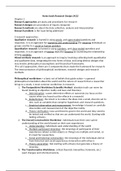Notes book Research Design (AS2)
Chapter 1
Research approaches are plans and procedures for research
Research designs are procedures of inquiry (enquete)
Research methods are about the data collection, analysis and interpretation
Research problem is the issue being addressed
3 research approaches:
Qualitative research is framed in using words, and open-ended questions and
responses. It is an approach for exploring and understanding the meaning individuals or
groups ascribe to a social or human problem
Quantitative research is framed in using numbers, and close-ended questions and
responses. It is an approach of testing objective theories by examining the relationship
among variables .
Mixed methods research is an approach to inquiry involving collecting both quantitative
and qualitative data, integrating the two forms of data, and using distinct designs that
may involve philosophical assumptions and theoretical frameworks.
In all 3 approaches, there are 3 components that create the framework for research:
The interconnection of (philosophical) worldviews, research designs and research
methods.
Philosophical worldviews = a basic set of beliefs that guide action = a general
philosophical orientation about the world and the nature of research that a researcher
brings to a study. 4 most common worldviews in research:
1. The Postpositivist Worldview/Scientific Method : absolute truth can never be
found (looking at objective reality and laws and theories).
a. Determination : causes determine effects or outcomes (so focus on the
causes when you found out the effects in a research)
b. Reductionism : the intent is to reduce the ideas into a small, discrete set to
test, such as variables that comprise hypotheses and research questions.
c. Empirical observation and measurement : knowledge is based on carefully
observation and measurement of the objective reality.
d. Theory verification : laws and theories govern the world and they need to
be tested and verified so that we can understand the world. Starting with
testing a theory.
2. The (Social) Constructivist Worldview: individuals have their own varied
understanding of the world based on their own experiences
a. Understanding : individuals seek understanding of the world
b. Multiple participant meanings : the meanings of participants of their
experiences (about certain objects or things) are multiple and varied, so
it’s hard for researchers.
c. Social and historical construction : the meanings of the individuals derive
from historical and social experiences (interaction with others).
d. Theory generation : Not starting with a theory but generate a theory of
meaning.
3. The Transformative Worldview: critical theorists (minorities: feminists, etc.)
want changes and reformed society
, a. Political : research inquiry needs to be intertwined with politics and a
political change agenda to confront social oppression at whatever level it
occurs.
b. Power and justice oriented : specific issues need to be addressed (issues of
empowerment, inequality, oppression, domination, suppression, etc.)
c. Collaborative : the inquirer will proceed collaboratively.
d. Change-oriented : a united voice for reform and change.
4. The Pragmatic Worldview: looking at the problem (the consequences of an
action) in the real world
a. Consequences of actions : this worldview arises out of actions, situations
and consequences (en niet zoals postpositivism uit voorafgaande dingen)
b. Problem-centered: focus on the problem and using all the approaches to
understand this problem.
c. Pluralistic : using all (a lot) methods to derive knowledge about the
problem
d. Real-world practice oriented
Research Designs = types of inquiry within quantitative, qualitative, and mixed methods
approaches that provide specific direction for procedures in a research study =
strategies of inquiry:
1. Quantitative design:
a. Survey research: numeric/quantitative description of trends, attitudes, or
opinions of a population by studying a sample of that population. With
questionnaires and structured interviews.
b. Experimental design: seeks to determine if a specific treatment influences
an outcome. With a treatment to one group and withholding it from
another group: checking how the treatments influences the outcome.
2. Qualitative design:
a. Narrative research: the researcher studies the lives of individuals and asks
one or more individuals to provide stories about their lives.
b. Phenomenological research: the researcher describes the lived
experiences of individuals about a phenomenon as described by
participants.
c. Grounded theory: the researcher derives a general, abstract theory of a
process, action, or interaction grounded in the views of participants.
d. Ethnography: the researcher studies the shared patterns of behaviours,
language, and actions of an intact cultural group in a natural setting over a
prolonged period of time.
e. Case studies: the researcher develops an in-depth analysis of a case, often
a program, event, activity, process, or one or more individuals.
3. Mixed Methods design:
a. Convergent mixed methods: converging quan. and qual. in order to
provide a comprehensive analysis of the research problem
b. Explanatory sequential mixed methods: conducting quan. research,
analyses the results and then builds on the results to explain them in
more detail with qual. research.
, c. Exploratory sequential mixed methods: exactly the reverse from (b)
Research Methods: Is about how they form the questions (open versus close-ended),
the data collection, the data analysis (text and image analysis versus statistical analysis),
the interpretation (statistical interpretation versus themes/patterns interpretation) and
the validation.
SUMMARY
Quantitative approach: Postpositivist worldview; experimental design; pre-test and
post-test measures of attitudes.
Qualitative approach: Constructivist/Transformative worldview; ethnographic
design/narrative design; open-ended interviewing; observation of behaviour.
Mixed Methods approach: Pragmatic worldview; collection of both quan. and qual. data
sequentially in the design.
Selecting a research approach depends also on the research problem and questions,
personal experiences and the audience. If qualitative and quantitative approaches are
not sufficient enough for the research, mixed method is the right option.






